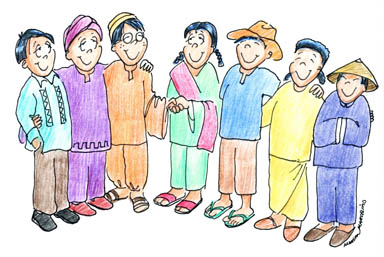RELATIONAL VIRTUE GROUP
Because I value others as those whom Christ created and redeemed, I choose to treat them as I would like to be treated.

RELATIONAL VIRTUE GROUP Because I value others as those whom Christ created and redeemed, I choose to treat them as I would like to be treated. |
|
I choose to accept the good in everyone and include them in my friendship.
|
Acceptance related virtues: Composure, tact, patiences, receptivity, tolerance, understand, willing to wait, racial equality, religious equality. Acceptance means: Tolerance and patience. Letting people do things differently because of culture, age or handicap. Using self-control when it is not a necessity to change the thing you personally dislike. Waiting for the right time without being upset or angry. Waiting for the slow without making them feel uncomfortable. Gladly putting off to the future what you may prefer today when you know it is best. Composure in the face of chaos. Calmly waiting in line.
|
|
See flipchart Click the picture below:
|
Family of God |
|
Matthew 5:41 If someone forces you to
go one mile, go with him two miles.
|
"Patience Under Provocation" from God's 800 number P-R-A-Y-E-R"
by M. Vasquez, p.138
|
| Planning ahead so you don't have the pressure of others in the family making you late. |
| Knowing God will do what is best when we want our prayers answered now. |
| Go to an old folks home and help them with lunch or a walk. |
Take 2 hours and dedicate it to your younger brother
or sister who is always trying to get your attention and let them decide
how to spend the time. |
| Tell what you learned from the experiences above. |
We are stewards of our time. How can we profitably
use our time when we are waiting for a taxi, lunch, checkout que, traveling
in the car, etc. |
| Biology: Different kinds of nature live peacefully together, all peoples should live peafully together. |
| English: Subject/verbs must agree to make sentences, people must agree to make friends. |
| Science/health: immune system |
| Nutrition: eating between meals vs. waiting. |
Uncle Arthur's Bedtime Stories, by Arthur S. Maxwell, R&H, 1964
Great Stories for Kids, by Jerry Thomas, PPPA, 1999
Christian Values Every Kid Should Know, by Donna Habenicht, R&H
The Children's Hour, by Arthur S. Maxwell, R&H, 1945
Treasury of Devotional Aids for Home and School by Department of Education
of General Conference of SDA, 1951
Statement on Tolerance
Seventh-day Adventists support the United Nations proclamation of 1995 as the
Year of Tolerance. This proclamation comes at an opportune time when intolerance
is abounding on all continents—bigoted religious extremism, racism, tribalism,
ethnic cleansing, linguistic enmity, and other forms of terrorism and violence.
Christians carry their share of the blame for prejudice and inhumanity toward
humans.
Tolerance, the capacity to endure unfavorable circumstances, is only a beginning.
Christians and all people of good will, must go well beyond this negative concept
and develop sympathy for beliefs or practices that not only differ, but even
conflict with their own. Dialogue is certainly much better than diatribe. Human
beings must learn to agree or disagree without violence; they must be able to
discuss varying viewpoints without hate or rancor. This does not mean docility
or abject submission, but partnership and respect for the equal rights of others.
Every person has the right and the responsibility to express both ideas and
ideals with verve and vigor, but without reaching the boiling point of violent
words or actions.
Finally, tolerance at its best means not only acceptance of other views and
people, but moving in benevolence, responsiveness, and understanding toward
others—every other human being.
This statement was approved and voted by the General Conference of
Seventh-day Adventists Administrative Committee (ADCOM) and was
released by the Office of the President, Robert S. Folkenberg, at the
General Conference session in Utrecht, the Netherlands, June 29-July 8,
1995.
| Primary: Middle: High school:
|